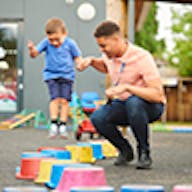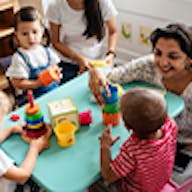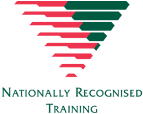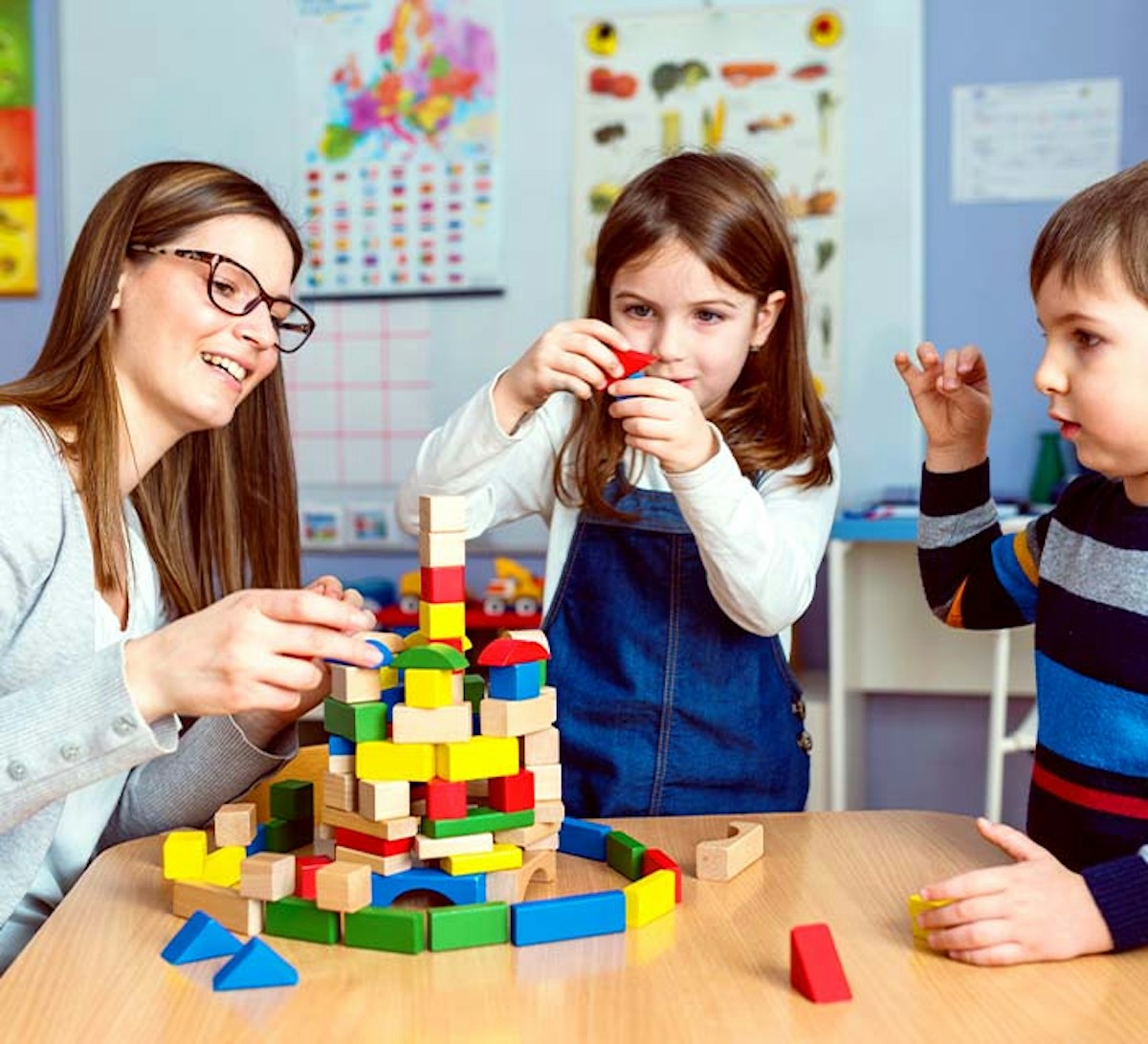Gain the qualifications you need to work in early childhood education with the combined Certificate III in Early Childhood Education and Care (Family Day Care) and Diploma of Early Childhood Education and Care course.
Do you love working with children and want to launch a career in early childhood education?
By completing the CHC30121 Certificate III in Early Childhood Education and Care (Family Day Care) and CHC50121 Diploma of Early Childhood Education and Care, you will graduate with the qualifications and skills to work in various early childhood education roles. This combined course gives students a broader range of skills to allow graduates to apply to a large pool of work opportunities.
By studying your early childhood education course now, you'll hit the ground running with a nationally recognised qualification.
When you complete this combined course, you'll be able to work in childcare centres, kindergartens and preschools at a senior level. Your skills will allow you to design and develop a curriculum and supervise other staff members. Alternatively, any student looking to open their own family day care centre will complete this course fully qualified to turn their home into a lucrative family learning environment.
To successfully complete this online course, you may need to complete a variety of assessments, including quizzes, knowledge questions and case studies. You will also need to participate in mandatory work placements in a regulated childcare facility in Australia where the supervising educator holds a Diploma of Early Childhood Education and Care or equivalent.
If you are a patient, friendly and reliable person who takes a holistic approach to educate pre-primary school children, you will thrive in an early childhood education role.
The Certificate III in Early Childhood Education and Care (Family Day Care) and Diploma of Early Childhood Education and Care is a Nationally Recognised course.
Course Outcomes
The skills and knowledge gained from the combined CHC30121 Certificate III in Early Childhood Education and Care (Family Day Care) and CHC50121 Diploma of Early Childhood Education and Care are nationally recognised, qualifying you for many roles. Here are some examples of employment opportunities you will be eligible to apply for once you have completed this combined course.

Long Day Care Educator
Working in a Long Day Care Centre, you’ll be in an environment that supports working parents, as these centres provide education and care for children from babies to the age of 12. They usually operate at least 10 hours a day, Monday to Friday, for at least 48 weeks a year and provide full or part-time care. Children may be grouped together according to their age and developmental stage and an approved kindergarten program may also be offered.

Family Day Care Educator
As a Family Day Care Educator, you will provide individualised education and care to small groups of children (no more than 4 children under school age) in your own home. You may also care for 3 additional school age children who attend family day care outside of school hours. Family day care offers children from birth to 12 years of age a safe education and care option in small groups of up to 7 children, traditionally in a home or family learning environment.

Kindergarten Assistant
As a Kindergarten Assistant, you’ll be working in a childhood education environment that is tailored to helping prepare children for prep. You’ll support children with play-based learning and help them to expand their physical abilities, build their confidence and enhance their social skills. Kindergartens usually operate during school hours each school term, and many offer programs for 6 hours a day, 5 days a fortnight during each school term.

Childcare Assistant
A Childcare Assistant provides care and structured learning to children, usually in a day care centre. As a Childcare Assistant, you’ll provide a caring, non-judgemental and supportive environment for all children and their families. You’ll supervise children as they learn and play, provide comfort and reassurance, plan stimulating activities, and keep children clean and safe.

Early Childhood Educator
An Early Childhood Educator, also referred to as a Childcare Worker, is responsible for the care and early education of babies and young children. They work in a range of settings, including kindergartens, childcare centres, community centres or schools. As an Early Childhood Educator, you’ll support the implementation of an approved learning framework, and support children's wellbeing, learning and development. Depending on the setting, educators may work under direct supervision or on their own within a team.

Lead Educator
The role of Lead Educator will vary depending on the educational environment, but in general, you will be developing and delivering a quality education program and practice and supporting children to participate in the program. You’ll work closely with the Childcare Director or Childcare Manager, and establish positive relationships with children and families. You’ll also coach and supervise other Educators.

Childcare Director
As Childcare Director, you’ll occupy the most senior position at a childcare centre and be responsible for managing the day-to-day operations. You’ll ensure a safe and educational environment for young children, manage childcare educators, develop learning programs in coordination with your team and communicate with parents. Your key duties will include the overall planning, administration, marketing and resourcing of the centre.

Educational Leader
The role of Educational Leader within an early childhood learning environment is primarily about guiding and developing educators’ and families’ understandings about play and leisure-based learning, and the significance of the early years in the education continuum for children.

Group Leader
A Child Care Group Leader takes responsibility for the planning, implementation and evaluation of the daily education program. As a Child Care Group Leader, you will lead the preparation of materials and equipment to support children’s learning, play and development. You’ll also be responsible for monitoring, assessing and documenting the children's individual progress. You’ll ensure the health and safety of children, support the inclusion of all children and develop positive and respectful relationships with the children in your care.

Assistant Director
In the role of Assistant Director to the Childcare Director, you’ll support in the running of operations and the overall leadership of the Centre. You’ll have the opportunity to work closely with the Centre Director and hone your leadership skills, as you manage and mentor a team of educators in their work with children and families.
Certificate III in Early Childhood Education and Care (Family Day Care) and Diploma of Early Childhood Education and Care
Delivery structure
Certificate III in Early Childhood Education and Care (Family Day Care)
Theoretical Elements:
Study the theoretical elements of this course anywhere and anytime through our online learning platform.
Practical Elements:
For mandatory work placement (160 hours), students must have access to a regulated education and care service provider in Australia, with an appropriate range of work tasks and ratios of children, AND access to a qualified supervisor (i.e. a person who holds a Certificate III in Early Childhood Education and Care or equivalent).
Diploma of Early Childhood Education
Theoretical Elements:
Study the theoretical elements of this course anywhere and anytime through our online learning platform.
Practical Elements:
For mandatory work placement (280 hours), students must have access to a regulated education and care provider in Australia, with an appropriate range of work tasks and ratios of children, AND access to a qualified supervisor (i.e. a person who holds a Diploma of Early Childhood Education and Care or equivalent).
Up to 36 months
Study load
This bundle qualification must be completed in the following order.
Certificate III in Early Childhood Education and Care (Family Day Care):
- Up to 18 months to complete CHC30121 Certificate III in Early Childhood Education and Care (Family Day Care).
- 17 course units to complete.
- Submit 1 course unit every month to graduate in 18 months.
- 160 hours of mandatory work placement.
Diploma of Early Childhood Education and Care:
- Up to 18 months to complete CHC50121 Diploma of Early Childhood Education and Care.
- 15 course units to complete.
- Submit 1 course unit every month to graduate in 18 months.
- 280 hours of mandatory work placement.

Delivery Structure
Starting with the Certificate III in Early Childhood Education and Care (Family Day Care) and then moving into the Diploma of Early Childhood Education and Care the entire course can be broken down into four parts:
1. Theoretical
Certificate III in Early Childhood Education and Care (Family Day Care) - Study the theoretical elements of this course, anywhere and anytime through our online learning platform.
Components
17 course units to complete.
Completed online, at your own pace.
2. Work Placement
Certificate III in Early Childhood Education and Care (Family Day Care) – for mandatory work placement (160 hours), students must have access to a regulated education and care service provider in Australia, with an appropriate range of work tasks and ratios of children, AND access to a qualified supervisor (i.e. a person who holds a Certificate III in Early Childhood Education and Care or equivalent).
Components
Students must apply for their Working with Children Check at course commencement.
Where required, we may assist you in identifying work placement options.
3. Theoretical
Diploma of Early Childhood Education - Study the theoretical elements of this course, anywhere and anytime through our online learning platform.
Components
15 course units to complete.
Completed online, at your own pace.
Resources required
To successfully complete this course, it’s essential that your placement provider has the necessary equipment, resources and/or documentation. For detailed information on these requirements, please reach out to our friendly Career Advisors to obtain a copy of the complete list.
For the online part of the course, you’ll need regular access to:
Computer: Laptop or desktop computer with working speakers or headphone points.
Internet: High-speed internet such as Broadband or ADSL, T1/T2, fibre optic (Dial-up access is not recommended).
Windows: Operating system – Windows 8 or above.
MAC: Operating system - OS X 10.14 Mojave or later.
Internet browser: Google Chrome, or Microsoft Internet Explorer 11.
Software: Flash, Adobe Reader, Microsoft Word (or Open Office which is free to download).
Office equipment: Printer and scanner to print and upload some of your assessments.
Mobile phone with video capability or video camera: Some assessments in your course may require you to take and submit videos of you undertaking tasks for assessment.
4. Work Placement
Diploma of Early Childhood Education and Care - for mandatory work placement (280 hours), students must have access to a regulated education and care provider in Australia, with an appropriate range of work tasks and ratios of children, AND access to a qualified supervisor (i.e. a person who holds a Diploma of Early Childhood Education and Care or equivalent).
Components
Students must apply for their Working with Children Check at course commencement.
Where required, we may assist you in identifying work placement options.
Units
Achieve your qualification by completing the following units of competency:
Certificate III in Early Childhood Education and Care (Family Day Care)
Cost and payment
You can pay for your course upfront via VISA/MasterCard or a bank deposit. Alternatively, we offer instalment plans that can be paid over several weeks or fortnights.
Your course fee includes
Delivery and assessment of your qualification
Study materials (including all resources)
Ongoing support from our Education Team
We offer two payment methods
Full fee upfront
Instalment plans
For more information about the course costs, please call us on 1300 616 197.
You May Also Be Interested In
CHC30121
Certificate III in Early Childhood Education and Care (Family Day Care)
Begin a meaningful career as an early childhood educator with specialist skills in Family Day Care, and make the most of the opportunities in this growing field.
CHC50121
Diploma of Early Childhood Education and Care
Build on your experience as an early childhood educator and gain the skills you need for the next phase of your career.
CHC30121 / CHC50121
Certificate III in Early Childhood Education and Care and Diploma of Early Childhood Education and Care
Prepare to launch your career in a fast-growing industry by gaining the necessary skills and training to work in early childhood education.




![FE_Partner Page_[MOBILE]-ECECPARTNER](https://www.datocms-assets.com/71768/1698982240-fe_career-pathways-and-partner-page-desktop-ecec.jpg?auto=compress,format&w=1200&fit=max)
![FE_Partner Page_[MOBILE]-ECECPARTNER](https://www.datocms-assets.com/71768/1719897098-fe_career-pathways-and-partner-page-mobile-ecec.jpg?auto=compress,format&w=1200&fit=max)
